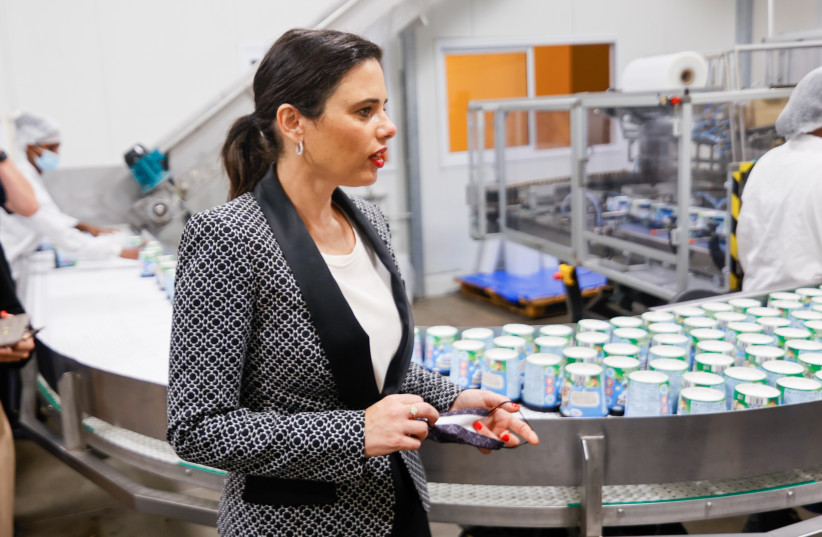Environmental Protection Minister and former Meretz leader Tamar Zandberg never dreamed that she would serve in a government led by the former head of the Yesha Council of Settlements, Prime Minister Naftali Bennett.
But now she not only defends Bennett’s government, in an interview with The Jerusalem Post, she pronounces it a resounding success. Like fellow party #2s Ayelet Shaked and Yifat Shasha-Biton, Zandberg is an independent force who has been given tremendous responsibility and intends to use her ministry to make Israel a better place.
Shaked is on the list for her influence behind the scenes on Bennett and Shasha-Biton for her controversial decisions that have clashed with the rest of the government, but all three #2s have proven themselves a force to be reckoned with in different ways.
See No. 12: The Deputies
See No. 14: Keeping Israel Safe
See full list
Download full magazine
See 2020's list
“I didn’t think I’d be an MK or a minister as a child,” Zandberg said. “I kind of fell into politics. When I was an MK in the opposition in Meretz, which was perpetually in the opposition, I imagined being in a government some day but never in such an experimental government that the international media called ‘the great experiment.’”

The government’s diversity, from the far Left to far Right of the political map, does not prevent it from getting things done, she said. She believes it is the serious personalities involved and the desire to help the country that enables the divides to be overcome.
“I see that the experiment is working,” she said. “The previous government was more homogeneous, but due to its ministers’ personal behavior, even if they had the same views, they were busy fighting each other and stealing each other’s credit. Now I work with Bennett, Shaked, [Ze’ev] Elkin and others who I have little in common with ideologically, and the level of trust is high. We won’t be annexing or relinquishing land, but the government is working professionally and has been a success so far.”
Asked what her red lines are for remaining in the government, Zandberg admitted that such red lines have already been tested with the Evyatar outpost, the controversial citizenship bill and the state budget. She recalled that when there was a dispute with Bennett over a bill Meretz opposed, he made a point of meeting with the Meretz faction at 2 a.m., listening and compromising.

“We aren’t dealing with red lines,” she said. “The relations in the government and coalition aren’t handled with bullying and fights but with dialogue. Because our ideology is clear, it’s easier to handle things. We can’t implement all our ideology now, but we can achieve a little bit. In our conscience, we’re fine with it. There will be no unilateral steps on the diplomatic or legal fronts. We won’t wake up one morning and find out we annexed something.”
Zandberg insisted on the Environmental Protection portfolio in coalition talks, knowing that such issues have grown in importance around the world. While there are environmental achievements in which Israel leads the world, like water recycling and desalination, there are plenty in which Israel lags behind.
Her goals in the ministry include passing a climate change law, taxes on carbon emissions, more limits on use of plastic and more recycling. She will also fight for maintaining natural resources and open spaces.
“The budget has good news for the environment, like minimizing disposable plates and plastic waste, which is very polluting and very important from our point of view, taxes on carbon emissions which we started for the first time, and fighting climate change,” she said. “From my first day on the job, I saw the gap between our needs and abilities, and this is true also for enforcement. When it comes to waste disposal, for instance, the solution is better enforcement, and we asked for more manpower for this, and also giving the tools and creating the infrastructure.”
Her ministry is investing NIS 550 million in the Arab sector, including NIS 300m. on enforcement of environmental laws and encouraging recycling.
Switching to renewable energy that does not pollute is a goal, because Israel is way behind the world on that front. Zandberg said Israel is making progress with and focusing on solar energy, but lacks the sources that Europe has, such as wind and hydroelectric energy.
“It is very important to expand the use of solar energy without taking open spaces, using rooftops of public buildings and in new neighborhoods. There are some amazing solutions including using parking lots and even cemeteries, roads and agricultural land. Israel can lead the way with the technology we are developing,” she said.
“My ministry used to fight with the Energy Ministry. Now Energy Minister Karin Elharrar and I cooperate on renewable energy. It’s part of our obligation not only to Israeli citizens but the entire world. There are incentives to renewable energy and removing bureaucracy in the Arrangements bill. Enforcing the Paris Agreement on renewable energy is important to President Biden and the European Union.”
However, there has been a conflict with the strategic plan of Israel to shift to its newfound natural gas off the Mediterranean coast. She said she would insist on the profits from taxing the gas and other natural resources being invested in the fight against the climate crisis.
“We have been saying that gas is a fossil fuel that is dirty, emits carbon and pollutes,” she said. “Nevertheless, there will be more use of gas in upcoming years. Our challenge is to expedite the changeover to renewable energy from both coal and gas.”
Part of this change can come as a result of new and old regional partnerships, she said, such as the Emirates, Jordan and Egypt.
Asked about the deals involving the transport of huge quantities of oil in tankers and pipelines in the particularly environmentally sensitive Red Sea area, Zandberg stressed these came from commercial agreements, not diplomatic ones, reached since the signing of the Abraham Accords. “I don’t think these are in tune with Israel’s interests,” she said.
“I signed the environment part of the Abraham Accords with the Emirati minister,” she said. “You’re asking about a commercial agreement of companies we are not part of and we are aware of the problems. We have challenges in the Mideast in energy and agriculture. We need to deepen cooperation in those areas.”
The forest fire outside Jerusalem last month reinforced the challenges that lie ahead. She noted that Hamas and Hezbollah attack every few years, but fires and other climate-related disasters happen a few times a year.
“We saw from the fires here, in the Mediterranean region and elsewhere in the world, that climate change is now, not in the future,” she said. “Extreme weather conditions, fires, floods and droughts will happen more and more in the years ahead. It’s a new world, and we need to prepare for it. There are steps we need to take, we know what they are and we are pushing for them to be implemented. The environmental disasters of the summer of 2021 will be remembered as a wake-up call and a turning point.”
